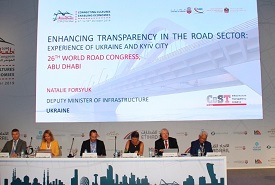Private companies bid for and deliver publicly-funded infrastructure projects. Responsible companies take pride in delivering high quality projects, on time and with cost-effective use of public funds. Where companies do not behave responsibly, there is a need to maintain fair competition for all.
We align with the aims of the private sector –

promoting fair competition for contracts and encouraging more effective project management by procuring entities. For instance, interactive dashboards from some of our members offer the private sector highly useful commercial insight including who is winning contracts, time and cost overruns and variations in infrastructure investment regionally.
We also work to tackle corruption, which damages both the reputation and efficiency of the sector.
The four pronged approach of CoST gives the private sector the opportunity to:
- Create a ‘level playing field’ and improve private sector confidence
- Enhance overall project quality and the likelihood of projects delivered on time and within budget
- Increase access to private capital and more favourable lending terms through better financial management
- Reopens markets which had previously been considered off-limits by responsible companies by reducing corruption
- Reduce reputational risk from association with projects where corruption has taken place
Transformation through partnerships
Our work on the private sector, including anti-corruption business integrity and capacity building through partnerships, has included working with Confederation of International Contractors’ Associations (CICA), and our role in the Global Initiative to Galvanise the Private Sector as Partners in Combating Corruption.
Private sector portal
‘Private Sector Perspectives on Infrastructure’ is a visual demonstration of the private sector’s views of infrastructure, and corruption risks in Africa and Latin America. The project was implemented by CoST as part of our work in Galvanising the Private Sector, supporting a better understanding of the challenges and opportunities that the sector faces. The portal is available in English and Spanish.
The project, supported by the Foreign, Commonwealth & Development Office (FCDO) and the British Embassy in Panama, focused on:
- Analyzing the availability and quality of data in national public procurement portals to assess how transparent and accessible information is for private companies.
- Conducting targeted research to identify the main barriers and incentives for private sector involvement, particularly in relation to competition and market access, pricing, data use and quality of public works.
The portal has a dynamic dashboard, highlighting findings by region for comparative data and insights. Both regional and national data can be used by government, media, and CSOS to inform decision making, such as making reforms; it can be used by the private sector to understand market competition. The portal helps to strengthen the relationship between the private sector and the public sector through increased understanding. The findings include private sector views on performance, the legal and regulatory framework, ethics, corruption risks, and more.
Take a look at the private sector portal.
Private sector benefits at the international level
We are also hugely beneficial to private actors at the international level. For instance, responsible international infrastructure companies seek fair and transparent access to contracts and good management, and will seek work where these conditions are most closely met.
Greater accountability and reduced corruption will encourage international and local construction companies to compete for work. This can have advantages for the national economy and governments because it:
- Enhances the country’s market credibility
- Is a positive factor for inward investment
- Encourages access to credit and loans on more favourable terms.
Our approach was endorsed by FIDIC on International Anti-Corruption Day 2019. This encouraged the 100+ Member Associations of FIDIC to consider how our approach can catalyse improved practices.
Read more about how transparent procurement systems benefit the private sector.
Multi-stakeholder working and the private sector

The private sector plays a key role for CoST members, notably through participation in multi-stakeholder groups (MSGs). MSG representatives include those from private companies and professional associations from across the infrastructure sector throughout our membership.
These members bring in managerial knowledge of the sector and they can help to translate the complexities of infrastructure projects to other members of the group. Their involvement also gives further credibility to the MSG as the group increases its engagement with other private sector actors and with the government. They can protect the infrastructure sector against any false accusations of wrongdoing and demonstrate a united approach in the call for greater transparency.
Building private sector skills and knowledge
We support the private sector to build knowledge and capacity on infrastructure transparency, accountability and participation, with a focus on increasing and improving data disclosure. We also work with influential construction sector bodies to raise awareness on the value of multi-stakeholder working; publication and independent review of data and social accountability.
Useful links
More details on multi-stakeholder working can be found in the Establishing a CoST multi-stakeholder group Guidance Note, also available as Creación de un Grupo Multisectorial CoST (Spanish). Read about how we’ve worked with the private sector in our partnerships page and impact stories.